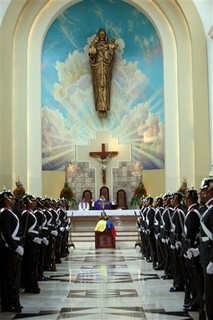Attentive readers of these posts know that my father, Loren B. Mead, is an Episcopal priest. Ordained more than fifty years ago in the Diocese of South Carolina, he served in the parish ministry at Trinity Church in Pinopolis, South Carolina and in Chapel Hill, North Carolina at the Church of the Holy Family. Once the relevant British authorities licensed him under the Colonial Clergy Act, he also served as the visiting Rector of Esher in the UK. While I was still a teenager he moved to the Washington area (where he and my mother still live) to found what later became The Alban Institute, one of the leading centers in the United States and even the world for the study of the life of congregations. Throughout his career he has thrown himself into the life of the church and of the wider society. At some personal and professional risk he worked for desegregation and racial justice in the South at a time when this was not always easy or popular. He was an early and strong advocate of the ordination of women in the Episcopal Church.
But he has always believed that the business of the church is ultimately the saving gospel of the resurrected Christ, and he has built his life and career on his understanding that it is Christian communities, congregations, where the Holy Spirit brings people together to form new communities and create new life. This is an ecumenical stance — not simply in the now-trivial sense of interdenominationalism among like-minded liberals, but in the more difficult and perhaps vital sense of finding common ground among liberal and evangelical Christians. Both Bishop Jack Spong and Pastor Rick Warren speak highly of my father’s work; I could wish that more people in the church were spoken of in the same way. The essay below was prepared for the journal of the Academy of Parish Clergy, Sharing the Practice.
Read Full Article »



